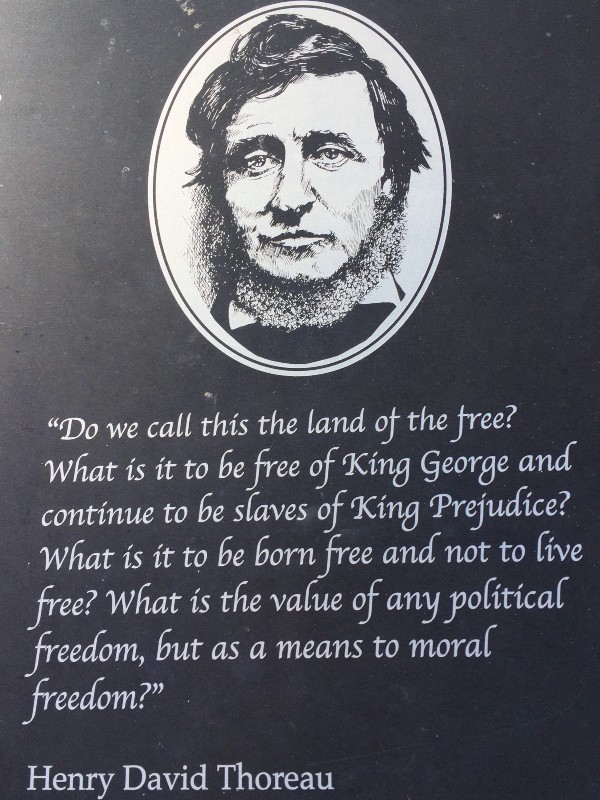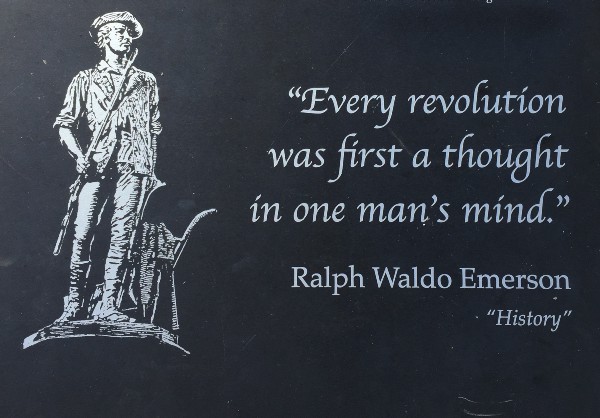(Originally appeared on Medium)
“The world has seen no grander movement than that of our Revolution…the people, to a man [sic], were full of a great and noble sentiment. It is marvelous to see how many powerful writers, orators, and soldiers started up just at the time they were needed…all made to unite in the one object of establishing freedom and independence in America.” — Nathaniel Hawthorne
Two hundred and forty-one years ago today, on April 19, 1775, a man named John Buttrick gave the command for the minutemen of Concord, Massachusetts to fire on British soldiers at the Old North Bridge. The Revolutionary War had already started, several hours before, down the road in Lexington. There had been about eighty Minutemen assembled on the town green, and eight had died. Still, in Concord, they were not to fire unless fired upon, which they were — and so Major Buttrick gave the order, the “shot heard round the world.”
John Buttrick’s property is now one end of the Minuteman National Park, which spans the Battle Road, stretching from Lexington west to Concord. I was there a few days ago, early in the morning, before the tourists descended, and the quiet was profound. The Buttrick estate, now the visitors’ center, sits atop a hill overlooking the Concord River and the bend with the bridge, and is surrounded by the rolling open fields where the Minutemen mustered, serene and sacred ground. It’s a place that does exactly what national parks are supposed to do: give us unmistakable ownership of our own history. It allows us, if we let it, to feel unironically proud. It reminds us that this country was founded with an extraordinary clarity of ideals.
A plaque from the Minuteman National Park.
It also allows us to pretend: what if I were one of the soldiers who stood right here? What if I were at the head of the column, here, facing the British regulars across this bridge? What would I have done? Would I have been at the bridge at all? What would I have thought of those disrupters, those original tea partiers, those rebels? Would I have joined them, or stood by in disapproval or hesitancy or fear?
I, for one, was raised to behave, and sometimes I wonder if, had I been alive in 1775, I might have been a Tory.
But I also have a pretty functional bullshit detector, which is working, always, against that old training to behave, and I dearly hope that in this alternate universe I would have instead plotted in taverns, stockpiled ammunition, written broadsides against the King. Heaved the tea into Boston Harbor.
I hope that if I’d been John Buttrick, I would have given the order to fire. I hope I would have accepted that enormous burden of disruption.
We all like to think that, at any given moment, we would have been on the right side of history.
Here’s the thing: I see both sides. I understand the fear of change, and I even understand the disapproval of the bold — that quiet or not-so-quiet outrage at those who dream big and hope for too much and upset the way of life that we have gotten used to. Back in December of 1773, as the colonies moved inexorably toward rebellion, I might have been indignant at the waste, the audacity, of the original Tea Partiers. I might have thought they had no appreciation of the real world, of how business works, of how change must happen slowly so as not to destroy all the good that’s already been accomplished.

This election is about fear. On the Democratic side, it’s about fear of change, fear of boldness, fear of risk, fear of being wrong. Possibly even the fear of being right. I can’t tell you how many people I’ve talked to who want to vote for Bernie Sanders but aren’t letting themselves, out of some strange brew of self-sabotage and cynicism and bargaining with the universe. I agree with all of Bernie’s ideas but I think Hillary is the safer choice. I’ve heard that so many times. If I don’t ask for much maybe I’ll get some of it. That seems to be the theme. That seems to be the compromise some people have made with themselves and their own hope.
But in America, the real America, the country we all believe still exists and that we want desperately to be a part of, we have always favored boldness and bravery — because there would be no America without them. Americans chose risk when they came to a continent unknown to them, a place with nothing they thought of a civilization. Native Americans chose risk when they defended themselves, refusing to acquiesce to a life they didn’t choose. Every immigrant since — and we are all immigrants, or their children — has taken the risk to come here in the name of autonomy and self-determination and freedom. And once we get here, by boat or by plane or by foot or by birth, we must realize we aren’t merely a group of individuals seeking our fortunes but a community, with all the large obligations and even larger benefits that that entails. We must realize we weren’t given this land of big dreams and huge heart to then shrink ourselves and our own instincts for what is right and possible.
The Founders were not prudent. The Founders were not practical. They refused to take an old thing, a pre-existing thing, the British Empire, and try to fit themselves to it. Their vision was different, and they rejected the way of being they had outgrown as a people, because that way of being, that subjugation, that negation of individual freedom, did not fit their vision of themselves and their fresh new nation.
The risks and changes Bernie Sanders are proposing speak to America’s very essence. They are changes that will both return us to our original ideals and build them anew in our new century. We are in imminent danger of losing sight forever of a society where all people are created equal. Of a government of the people, by the people, and for the people.
It’s difficult when authorities become corrupt. When we can no longer believe those to whom we’ve entrusted power, and we have to take matters into our own hands. But make no mistake, the authorities of America right now, the keepers of money and power, have deep stakes in keeping politics exactly the same. Luckily, the mechanism for disruption is in our hands: democracy. Americans before us have fought and died for it. It is our greatest gift, and not to exercise it fully, not to believe in it as an instrument, to reduce its power by compromising our own hopes and ideals in our vote, is a civic sin.
There was no way those farmers and their muskets should have won at the Old North Bridge. Except they did. The British had no idea what to expect, no idea what they were dealing with; they turned tail and fled, back to Boston, leaving their wounded behind. As battles go, the Battle of Lexington and Concord was a small one, but it was the start of a war, and of a nation. Neither of those would have succeeded without a great excitement, and unity, and passion on the part of the people. That boldness is our legacy, today, on April 19, 2016. It’s embodied in the extraordinary movement of Bernie Sanders. We’ve been given a gift. We cannot be afraid to take it.

